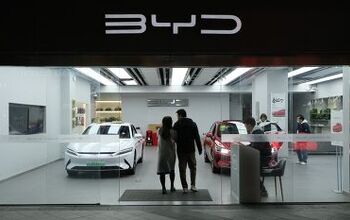Amid Losses, Daimler Rethinks North American-made Sedans

Domestic automakers have largely rid their North American facilities of sedans, so why shouldn’t foreign manufacturers? That’s what Mercedes-Benz parent Daimler plans to do after announcing a second-quarter loss of $1.9 billion.
While the quarterly loss was less than analysts expected, financial and sales pressures brought on by the coronavirus pandemic has led the automaker to cull car production on this side of the pond.
“Our systematic efforts to lower the breakeven of the company by reducing costs and adjusting capacity will need to continue,” CEO Ola Kaellenius said, per Reuters.
In terms of production, that means a number of things. The company has already decided to ditch a French assembly plant that once cranked out Smart models for North American consumers, but can now be replaced by a Chinese facility (after Geely’s purchase of a 50-percent stake in the brand). In North America, the plan is to get the Mercedes-Benz C-Class out of Alabama.
The automaker’s best-selling car in the U.S., the C-Class entered production in Vance, Alabama in 2014, though it was rumored last year that future generations of the model would hail from elsewhere. The plant focuses mainly on the GLS and GLE utility vehicles, and that’s where M-B sees future growth.
South of the border, the company’s plant in Aguascalientes, Mexico (that’s the joint Renault-Nissan one) will cease production of “a variant” of the A-Class, Reuters reports, turning its attention to the new Mercedes-Benz GLB small crossover. The A-Class sedan entered production at the plant in September 2018.
[Image: Daimler]
More by Steph Willems


































Comments
Join the conversation
OK, guys, take a deep breath. If you don't agree with me that's fine. And, if I don't agree with you, that's also fine. @Arthur Dailey, You completely contradict yourself: "They deny that COVID is a threat. They deny that climate change exists. They deny that vaccines are beneficial..." So, apparently you're saying all those things are true; that disputing them is being a "denier." We all know that "denier" and "conspiracy theorist" are current pejoratives. But, then you go on to say: "Science deniers will often revert to the demand that 100% of scientific articles/journals/research agree. Something that is an impossibility as by definition scientific knowledge is always expanding." Which is certainly true, but completely at odds with all that "denier" stuff you listed. So, which is it: Wrong to question the utterances of our scientists or wrong to be in dogmatic agreement with a certain scientific position?
@Lie2me - Agreed. I seriously doubt that after 3 years and 8 months or so in the role, he has finally realized that the best re-election strategy is to actually do the job you were elected to do!
@Lou_BC, "It makes perfect sense that you want to exit this discussion. Being forced to reassess one’s position is never easy" So, I should reassess my opinion based on this discussion? Hmmm, no. Once, you've looked behind the curtain you can't go back to believing in the wizard.
@Lie2me, "Not even a little bit" Sigh, I tried...